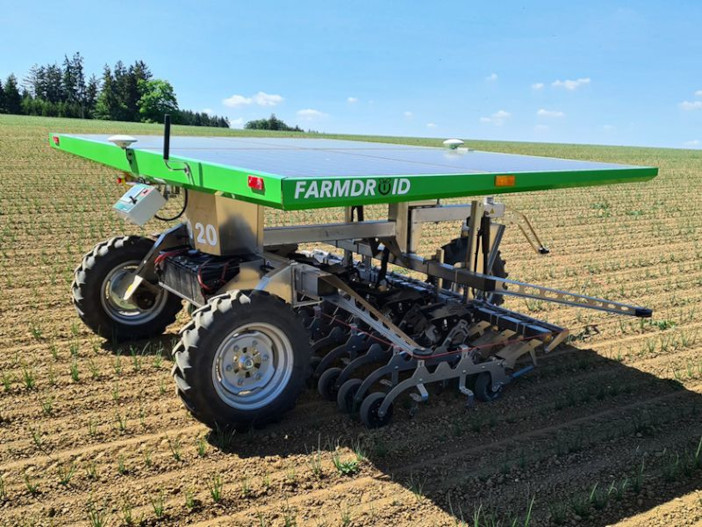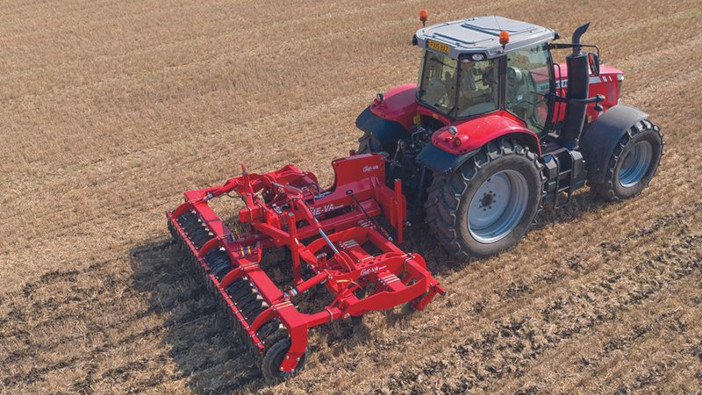Dealers are reporting significant changes in the demand for new kit, driven by a move to regenerative farming, robotics and data-based decision-making. Visitors to the Midlands Machinery Show will get the opportunity to see the latest offerings.
“After root crops or pigs there is certainly a place for ploughing to reset the land, but many growers are moving towards regenerative systems which leave the soil profile and structure intact,” said Chandlers managing director Gavin Pell.
“Some modern subsoilers have very low surface disturbance and can be used to alleviate compaction without disturbing the soil profile. For example, with the He-Va Stealth, a disc makes a cut and a leg passes through. The soil profile is not inverted.”
Growers using a min-till or no-till regime are increasingly looking for effective, low-disturbance subsoiling, said Mr Pell. “This is to loosen and fracture the medium depth subsoil to relieve compaction, assist drainage, aeration, nitrogen uptake and to encourage crop rooting.”
Very shallow surface cultivators are also proving popular for stale seedbeds, he added. “They promote weed seeds to chit. As the cost of chemicals rises some growers are using cultivators instead of glyphosate.”
With less and lighter cultivation being carried out, there is a matching trend away from very large tractors. The new 260-280hp Gen7 Fendt 700 series tractor introduces the VarioGrip tyre pressure regulation system into this lower hp sector. This reduces soil compaction by lowering tyre pressures in the field while returning to a safe pressure for roadwork needed between fields, said Mr Pell.
We are increasingly seeing farmers who are looking for low disturbance direct drills that don’t compromise on the quality of the seedbed, in particular, good seed-to-soil contact, said Dani Bond, general manager at Mzuri.
“The Mzuri Pro-Til and iPass drills use tines to generate a small amount of tilth which the seed is placed in and efficiently reconsolidated to maximise germination rates.
“The flagship Pro-Til one-pass drill offers strip tillage and direct establishment into stubble and cover crops and remains a popular choice with growers looking to reduce establishment costs compared to conventional systems.
“The iPass, launched earlier this year, has been specifically designed to offer high output, efficient low disturbance seeding direct into a range of field types at high operating speeds, whilst consistently maintaining an accurate drilling depth – something which our Mzuri range is known for.
“We are looking forward to the Midlands Machinery Show where we hope to showcase both the Pro-Til and iPass, alongside our new low disturbance subsoiler the Rehab,” said Ms Bond.
Jonny Newton, depot manager and area sales, Eggborough at Yorkshire-based machinery firm, Russells, said that overall there has been an increase in the average horsepower of tractors sold to UK farms. “Up from 155hp, the new average is now 167hp. Most farmers are increasing tractor size but, in some cases, reducing fleet size due to staff shortages and smaller working windows.
“These tractors are also more technologically equipped than their predecessors with a lot of features now being standard and the option to add more features and benefits very easily. A road speed of 50kph now seems to be the norm across most manufacturers coupled with front linkages and PTOs.
“GPS guidance has also become more popular over recent years with most farmers having some form of guidance from a simple lightbar system to full auto-steer, ISOBUS compatibility and section control.”
Some growers are looking at dispensing with tractors altogether in some applications, in favour of robots. A fully autonomous, solar-powered robot capable of precision drilling and weeding has joined the Opico lineup.

The FarmDroid uses ultra-accurate GPS to record exactly where it places each seed. On each subsequent weeding pass, it has no need to identify what’s a weed and what’s not – it simply knows where the crop plants should be and works around them.
“We believe robotics will form the backbone of the next major step in technological development for agriculture,” said Opico managing director James Woolway.
“While it’s early days, we’re coming to the UK market with a product that is tried and tested. The timing couldn’t be better with rising energy costs, labour issues and environmental factors at the forefront of UK farmers’ minds. FarmDroid ticks so many boxes in all these respects.”
As input costs rise, collecting and analysing data from tractors and farm machinery to improve operational efficiency is also a growing trend, said Farol director Kevin Newman. “We are collecting data like fuel consumption on field operations and spray/fertiliser application information. We can then use this data to pinpoint inefficiencies which we can help to improve.
“A key talking point at the moment is idle times. At busy times on the farm, it’s easy to jump out of a tractor or machine to do a quick job which turns into a big job. By leaving the tractor/machine running operators are using fuel, eating into servicing hours and negatively affecting its residual value.
“When diesel was 67p/litre last August [2021], leaving the tractor on might not have been at the front of everyone’s mind, but at £1.10/litre, there is a significant cost,” explained Mr Newman. “We have been working with farms and their operators to try to help them improve idle times where possible.
“Another area offering a cost-saving opportunity is precision agriculture applications. We can use data from the John Deere Operations Centre to analyse applications and make sure fertiliser and chemicals are being applied accurately. If these are applied incorrectly, they can damage yield, costing the farm greatly.”


